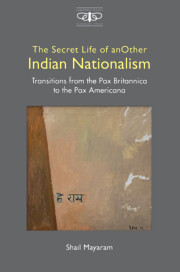 The Secret Life of AnOther Indian Nationalism
The Secret Life of AnOther Indian Nationalism Book contents
- Frontmatter
- Dedication
- Contents
- List of Figures
- List of Abbreviations
- Preface
- Acknowledgements
- Note on Transliteration
- 1 Introduction: Colonialism, Orientalism, Nationalism and the Shaping of Popular History and Religion
- 2 Orienting the Vernacular Imaginaire: James Tod and Indian Nationalism
- 3 War and Violence in Savarkar’s View of Indian History
- 4 Nationalism and Time: The Vishva Hindu Parishad’s Fantasmagorical History
- 5 Transforming Hinduism: The Politics of Vishva Hindu Parishad Conversion
- 6 AnOther History of Religion
- 7 Sushila Rawat, the Healer of Husain Tekri: Myth and Medical Pluralism as Resistance to Hindutva
- Index
2 - Orienting the Vernacular Imaginaire: James Tod and Indian Nationalism
Published online by Cambridge University Press: 11 February 2022
- Frontmatter
- Dedication
- Contents
- List of Figures
- List of Abbreviations
- Preface
- Acknowledgements
- Note on Transliteration
- 1 Introduction: Colonialism, Orientalism, Nationalism and the Shaping of Popular History and Religion
- 2 Orienting the Vernacular Imaginaire: James Tod and Indian Nationalism
- 3 War and Violence in Savarkar’s View of Indian History
- 4 Nationalism and Time: The Vishva Hindu Parishad’s Fantasmagorical History
- 5 Transforming Hinduism: The Politics of Vishva Hindu Parishad Conversion
- 6 AnOther History of Religion
- 7 Sushila Rawat, the Healer of Husain Tekri: Myth and Medical Pluralism as Resistance to Hindutva
- Index
Summary
After his defeat by the Sultan Alauddin Khalji, Rana Bhim Singh, then ruler of Mewar, pondered the means whereby at least one of his twelve sons might survive
… when a voice broke on his solitude, exclaiming ‘myn bhooka ho’ [I am hungry]; and raising his eyes, he saw, by the dim glare of the cheragh [lamp], advancing between the granite columns, the majestic form of the guardian goddess of Cheetore. ‘Not satiated,’ exclaimed the Rana ‘though eight thousand of my kin were late an offering to thee?’ ‘I must have regal victims; and if twelve who wear the diadem bleed not for Cheetore, the land will pass from the line.’ This said, she vanished.
The princes contended for becoming the first victim of the goddess. After eleven had been killed, the Rana contemplated self-sacrifice. ‘But another awful sacrifice was to precede this act of self-devotion’, in that horrible rite, the jauhar, the rite through which ‘females are immolated to preserve them from pollution or captivity’.
A near century after James Tod's account, the Bengali writer-artist Abanindranath Tagore's famous collection of children's stories called Rājkahānī dramatically retells Sultan Alauddin's siege of Chittor. The goddess appears before Maharana Lakshman Singh and the room comes alive with the fragrance of her flowers and tinkling anklets. Lakshman Singh beholds Chittoreshwari Ubar Devi, the goddess of Chittor, and is both paralysed with fear and a sense of wonder and devotion at this spectacular sight. The lamp drops from his hands when she says,
I am hungry. I am hungry for blood. My thirst will be quenched only with blood. Maha Rana, rise and awake. Sacrifice your blood for your Motherland. Quench my thirst with the blood of Rajput heroes. Every Rajput must make a great sacrifice for Chittor or else the great Surya Vamsa [lineage] will never be able to retrieve the throne of Chittor from the Pathans.
In Abanindranath Tagore's retelling the sacrificial deaths are for the nation as Motherland.
Tod's images have reverberated in prose and verse, been amplified in histories and pamphlets, and have resounded from stage and podium. Few persons have had such a lasting impact on the Indian popular nationalist imagination.
- Type
- Chapter
- Information
- The Secret Life of AnOther Indian NationalismTransitions from the Pax Britannica to the Pax Americana, pp. 44 - 85Publisher: Cambridge University PressPrint publication year: 2022


